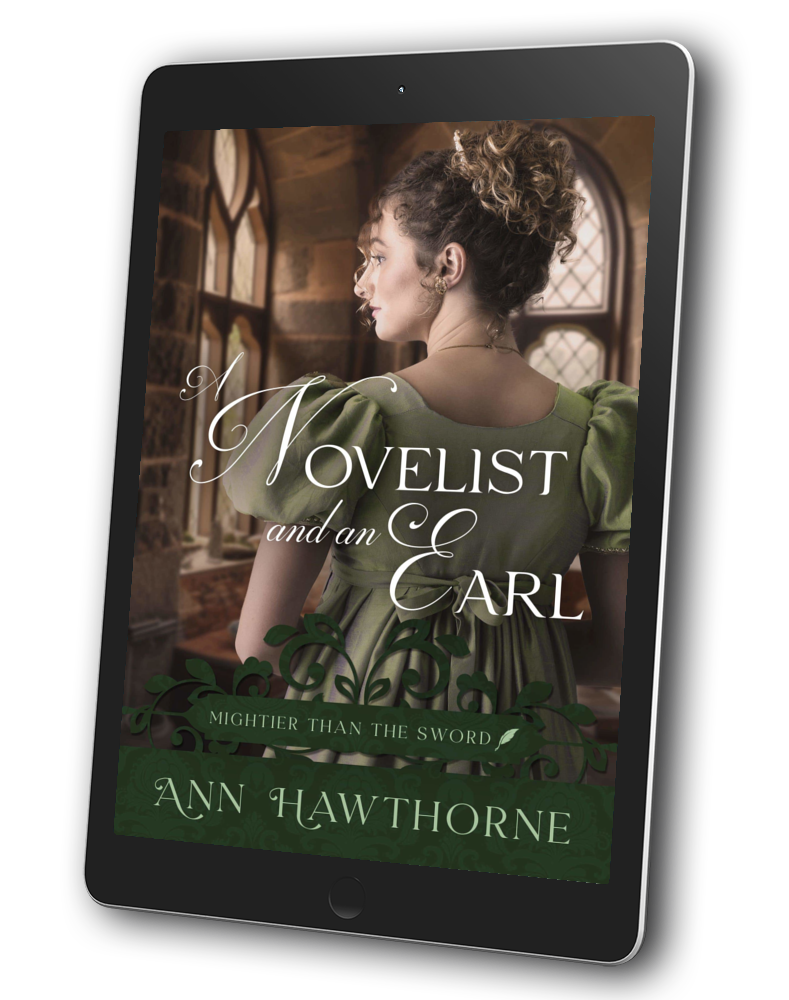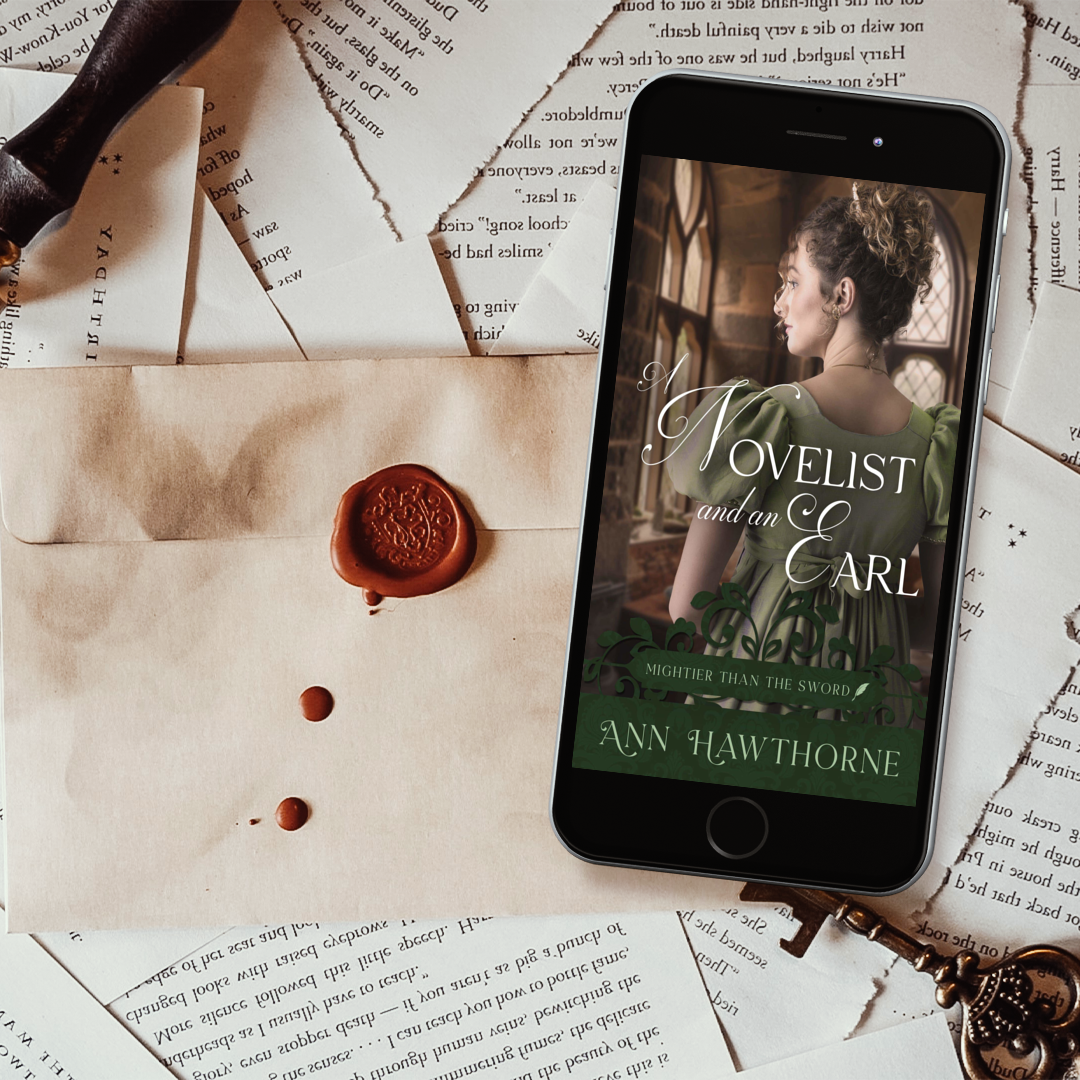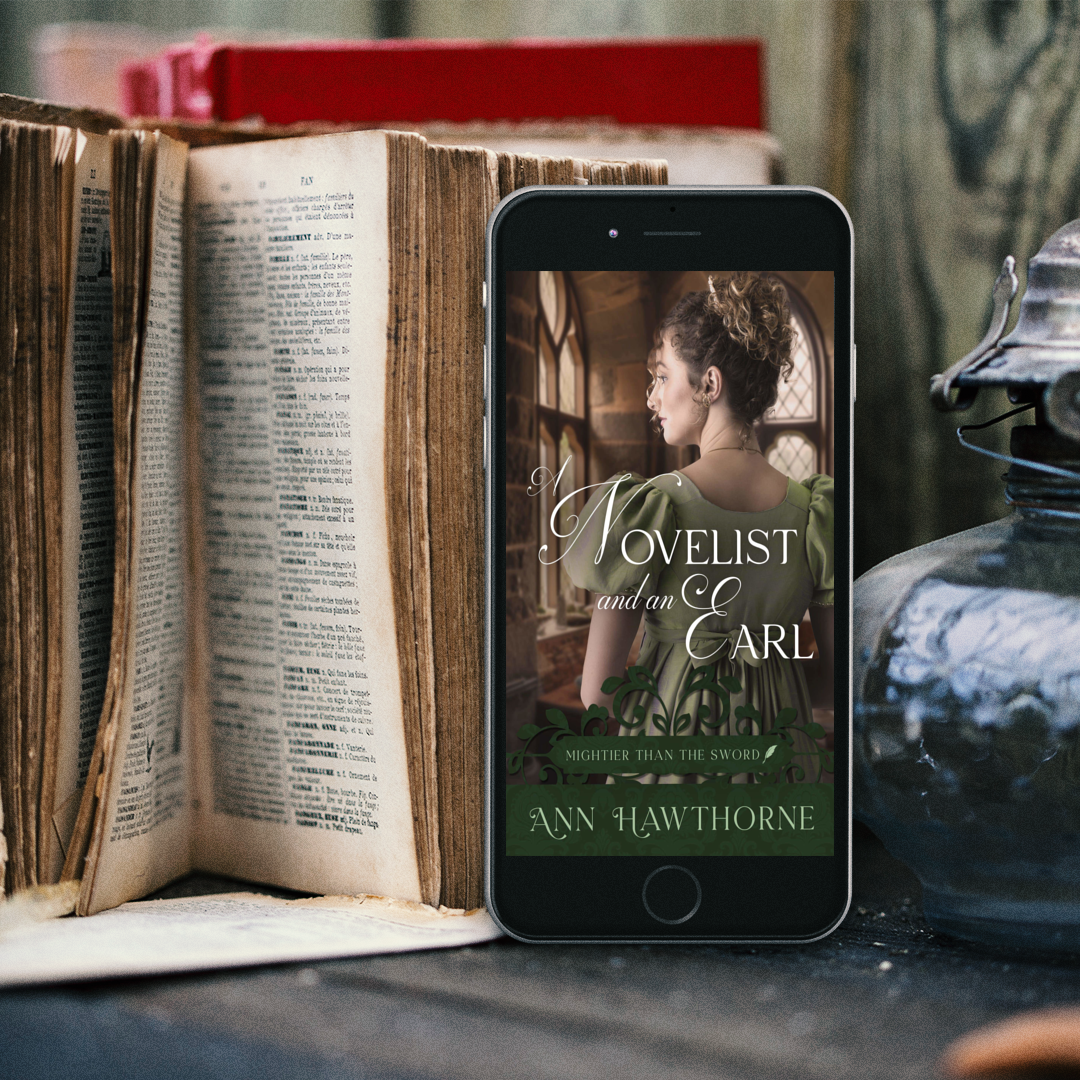A Novelist and an Earl
A Novelist and an Earl
Couldn't load pickup availability
A heroine in thrall to duty. A hero in thrall to his legacy. Will their arranged marriage lead to happiness?
The only time Isabella Rivers ever broke the rules of good behavior was when she started writing Gothic novels - and even then she used a pen name to avoid embarrassing her genteel family.
When her parents arrange her match with the Scottish Earl of Airth, she obeys with her usual quiet pragmatism.
However, not only does she find herself a stranger in a strange land - she also realizes her new husband is keeping many secrets from her…
George Trevelyan inherited the earldom after his dashing older brother’s death. Being unfavourably compared to his charming late sibling is the least of his problems, though - the estate is failing, the taxes are climbing higher, and soon he finds himself engaging in dangerous ventures just to keep the people who depend on him fed. He is determined to bear his burdens alone.
However, his bride proves too inquisitive - and beautiful - to let him do that…
Share
Read a Sample
Read a Sample
‘Don't be silly, Belinda, he is not going to
come’. Isabella Rivers turned away from her younger sister and glanced out the
window. The view from their room in the Blackwood Hotel opened onto the heavy gray
sky above and the world of heavy gray stones below.
‘How do you know?’ Belinda was persistent. ‘It
would make sense for His Lordship to want to surprise his intended before they
arrange the ceremony’.
‘I am sure it would, if he were a character of
a chivalric romance or a particularly silly modern novel. A far as I know, he
is neither’.
‘Such things have happened in real life’,
Belinda countered. ‘I have read my histories, too, you know. In the days of the
eighth Henry, King James of Scotland surprised his bride Margaret by galloping
to meet her in the guise of a simple minstrel, his lute slung over his crimson
doublet’.
‘I wonder if anyone was taken in by this.
Minstrels usually could not afford crimson doublets’.
‘That was not the point, and you well know it.
You cannot deny there is something quite romantic about the notion’.
‘It was a royal match. Perhaps, he simply
wanted to make a good impression on the diplomats as much as on the lady.
Besides, kings are prone to doing peculiar things. They always were.
Thankfully, I am not marrying one’.
‘No, you are marrying a simple earl’, Belinda
teased her.
‘I am not complaining’.
‘You never do. I cannot quite believe you have
not a romantic bone in your body, Isabella; I have read your novels, after all.
They are quite full of dramatic happenstance and lovers reunited’.
‘And also of murders, poisonings, and family
secrets. I shudder to think what you surmised about my character from that
part’.
‘Well, that was quite thrilling to read, too’.
‘That was the point. Of all of it, both the
poisonings and the lovers. I write what the public finds thrilling to read,
sister. It has nothing to do with some secret yearnings of mine’.
‘Are you going to abandon your inkwell now?’
‘What?’
‘I mean, now that you will be the Countess of
Airth. I imagine you are going to be busy. Besides, even if you will have free
time, I am not sure your husband will suffer seeing his wife's name appear in
print’.
‘He would not have to, for that matter. I have
a pen name, remember? For the reading public, I am Signora Fiume’. Isabella
preferred not to think too long or too hard about just how much of the role the
Italianate pen name played in her success. After the Renaissance-set dramatic
novels of Ann Radcliffe, the public was hungry for the stories of Italian
castles, and Isabella judged that, if she had to hide her name to avoid
embarrassing her parents anyway, it might as well be something that would help
her sales. ‘Besides, we have no reason to suppose that he adheres to Pericles’
views on virtuous womanhood. Father can hardly be called a radical of William
Godwin’s frame, but he allowed me to continue under an assumed name. Perhaps,
His Lordship is going to be just as sensible’.
There was a scent of rain blowing in from the
open window, the smell of gray water on ancient stones.
Somewhere in the distance, Isabella could hear
hammering—from what she had heard at dinner, there were a lot of new buildings
being erected in Edinburgh, the town slowly blossoming into prosperity like a
once-forgotten flower.
‘Still’, Belinda insisted, ‘I think it's
rather cold of His Lordship not to meet you here, instead to simply wait for
you to come to his estate. He knows you have never been that far north before,
after all. If I were a gentleman, I would have done my utmost to soothe my
future wife and attend to her comfort’.
‘What a thoughtful suitor you would have made
for someone’, Isabella joked. ‘Alas, my future husband has little reason to do
the same. He has seen me the whole of three times, and then rather briefly.
That is not quite enough for this sort of tenderness to grow’.
‘Are you not sad about marrying someone who
feels no tenderness for you?’
‘I have always known it was going to be
something like this’. Isabella shrugged. ‘Besides, that doesn't mean he is
going to never feel any affection for me in the future. One can find sweet
contentment in marriage without any romantic gestures or dramatic adventures
involved. Indeed, most people do’.
‘Are you quite sure you are nineteen?
Sometimes you speak like a matron of forty years behind her at the very least,
and one who has led a very sorrowful life’.
‘I am quite sure of my age’, Isabella replied,
perhaps more primly than was strictly needed. ‘But I know my duty. There is no
possibility that I can ever evade it; there never was any possibility.
So why engage in idle dreams? Better to sew something fine out of the material
one has been given’.
Still, she could not quite resist another look
outside, where, far below, the busy thoroughfare of the Princes Street lay.
She did not expect George Trevelyan, the Earl
of Airth, to appear galloping down it at any moment. But, as Belinda could not
hear her thoughts, she could admit to herself that she would not have been
others to the sight.
***
‘Would you like me to ask the kitchen to
prepare something for the journey, Your Lordship?’
George Trevelyan, the Earl of Airth, turned
around sharply. His old housekeeper was standing on the threshold that
separated the foyer from the rooms beyond—comfortable although Castle Airth now
was, it lacked the sweeping staircases of the country houses of the south.
‘What do you mean, Mrs. McKenzie?’
‘Why, only that you are going to be hungry on
your journey to Edinburgh! Unless you only intend to eat at the inns? The
expense…’
George sighed with fond exasperation. The old
housekeeper had once been a nursemaid to his father, and, when the late earl grew
up, she had remained with the family… He almost said until the bitter end.
But he was going to do his utmost to ensure that the bitter end in question
would never arrive.
‘I am not going to Edinburgh. Indeed, I had no
such intention. Why would I?’
‘Because your wife-to-be is currently there’.
‘But she is going to arrive here soon enough.
What would be the point of intercepting her on the journey?’
‘I am sure the lady would appreciate it’, Mrs.
McKenzie said as tactfully as she possibly could.
‘She did not strike me as a woman fond of
spur-of-the-moment extravagance’.
To be fair, there were not that many occasions
when Isabella Rivers had the chance to strike him as anything. His stay in
London had been relatively brief, and did not even last the full Season. His
search was for a woman of good upbringing and good sense, not of a Grecian
goddess in flesh, as some young men tended to seek. Marrying well was his duty,
giving the estate a good mistress was his need.
He was very glad when he found out that
Viscount Rivers had two daughters, and that the eldest one was already out.
During the few evenings George had spent in the family’s townhouse, the
Viscount spoke more than his daughter ever did. George could remember her well,
standing with her eyes downcast or sitting with knitting in her lap. He
remembered being struck by this small detail—that she occupied her hours with
making something warm and useful, not with seemingly impressive but mostly
ornamental accomplishments that so many mothers pushed their daughters to
develop.
She had very fine gray eyes, too. He had felt
their full impact only once, when, during a suitably chaperoned conversation in
their parlor, she had abandoned her slightly too modest, slightly sideways look
and gazed at his face with new frankness. In the corner of his eye, George
could see her mother glaring at her, probably perceiving her staring as unladylike;
nothing could be further then from thoughts in George's own head, however.
That morning, he was talking about… What on
earth was he talking about? Something about his own late mother;
something about the summers when she took the boys to see the place where one
of her Norse ancestors fell, for the late Countess of Airth had been as proud
of her long-diluted Viking blood as though the longships have arrived on these
shores a mere year ago. George was not sure any of that would be of interest to
a young woman, but evidently he was wrong. The Honorable Miss Isabella Rivers
was all intention. And in that moment he discovered that her eyes were not pure
gray, but had blue flecks around the iris.
All nonsense, of course. No man of sense would
base his decision on whether or not to marry a woman on such things. No more
did he—when he proposed, he took into account their respective lineages,
upbringings, and financial situations. He did not think about her eyes. He was
certainly not thinking about them now, and he most surely was not going to go
on a three-day journey south only to see them sooner than was planned.
As though hearing his thoughts, the old
housekeeper tut-tutted.
‘She is a young lady, Your Lordship. She has
never been here before. She probably has some notions of how a man of courtesy
should behave. Some hopes’.
‘In that case, it would be better if I
disabused her of such notions as soon as possible. I have no intention of
mistreating her, of course; God knows, I have never been cruel to a woman, and
never will be. But what mercy would there be in letting her believe I am some
hero from a novel?’
‘The late earl would have done so’.
‘My father, you mean?’
‘No, your Lordship. Your brother’.
She was right. Andrew would have probably done
so indeed. He would have been off to intercept her in Edinburgh in a dash; he
would have probably brought gifts, too, and entertained her whole family at
dinner, his warm smile seemingly made to put maidens at ease.
Andrew would have done that, and many things
besides. But George was not his brother. Indeed, he had no intention at all of
becoming more like his brother. If going south for a pointless gesture was one
step in that direction, that only made him less willing to take it.
‘I am not him, Mrs. McKenzie’, George said,
his voice lower. He liked the housekeeper, and knew that she always had the
well-being of the family in mind. But just because she remembered when the
estate still sported bare rafters overhead and an open chimney in the patched-on
kitchen of black turf, that did not mean she had a license to direct his
conduct. ‘Now, if you will excuse me, I have business to attend to’.
‘Where are you going to?’ The housekeeper
dropped the topic. She knew when he was not to be budged. She probably also
knew what kind of business he was referring to.
‘To the lake’, George replied, and strode out.
They both knew what lake it was; neither
needed to name the loch deep within the acres of his lands by name. Neither did
they need to discuss his purpose.
How Will I Get My Book?
How Will I Get My Book?
- Purchase the E-Book instantly
- Receive the Download Link via Email
- Send to Preferred E-Reader and Enjoy!






